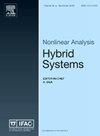具有时延的奇异马尔可夫跃迁系统可接受性分析的宽松标准
IF 3.7
2区 计算机科学
Q2 AUTOMATION & CONTROL SYSTEMS
引用次数: 0
摘要
本文研究了具有时延的奇异马尔可夫跃迁系统的可接受性分析问题。在不引入更多变量的情况下,提出了一个增强的 Lyapunov-Krasovskii 函数(LKF),它不要求所有矩阵都满足正定约束。受基于自由矩阵的不等式的启发,提出了一个改进版本,以获得更精确的积分项估计。基于新颖的 LKF 和改进的不等式,提出了一些宽松的随机可接受性标准,这些标准不那么保守。最后,通过几个实例验证了所提结果的有效性。本文章由计算机程序翻译,如有差异,请以英文原文为准。
Relaxed criteria on admissibility analysis for singular Markovian jump systems with time delay
This article studies the problem of admissibility analysis for singular Markovian jump systems with time delay. Without introducing more variables, an augmented Lyapunov–Krasovskii functional (LKF) is presented, which does not require all matrices to satisfy the positive definite constraint. Inspired by free-matrix-based inequality, an improved version is proposed to obtain more accurate estimation of the integral term. Based on the novel LKF and the improved inequality, some relaxed stochastic admissibility criteria are proposed, which are less conservative. Finally, several examples are offered to verify the effectiveness of the proposed results.
求助全文
通过发布文献求助,成功后即可免费获取论文全文。
去求助
来源期刊

Nonlinear Analysis-Hybrid Systems
AUTOMATION & CONTROL SYSTEMS-MATHEMATICS, APPLIED
CiteScore
8.30
自引率
9.50%
发文量
65
审稿时长
>12 weeks
期刊介绍:
Nonlinear Analysis: Hybrid Systems welcomes all important research and expository papers in any discipline. Papers that are principally concerned with the theory of hybrid systems should contain significant results indicating relevant applications. Papers that emphasize applications should consist of important real world models and illuminating techniques. Papers that interrelate various aspects of hybrid systems will be most welcome.
 求助内容:
求助内容: 应助结果提醒方式:
应助结果提醒方式:


